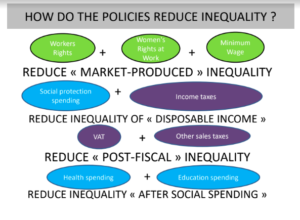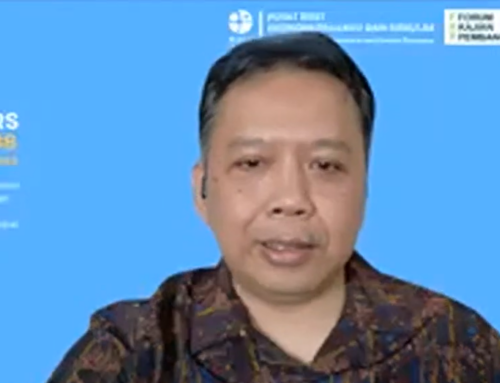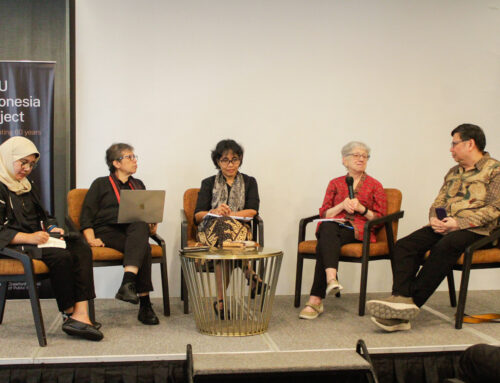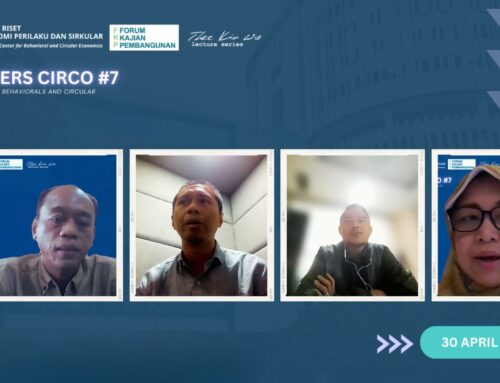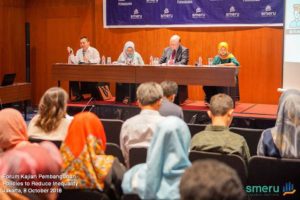 Indonesia has seen a declining rate of inequality in recent years. However, persistently high rates of inequality show that more needs to be done. On Monday, 8 October 2018, the first FKP event of the month was hosted by The SMERU Research Institute at Morrissey Hotel, Jakarta. Matthew Martin (Development Finance International), Athia Yumna (The SMERU Research Institute), and Ferry Irawan (Directorate of Regional Economic and Real Sector Development), Ministry of Finance shared their research findings and perspectives.
Indonesia has seen a declining rate of inequality in recent years. However, persistently high rates of inequality show that more needs to be done. On Monday, 8 October 2018, the first FKP event of the month was hosted by The SMERU Research Institute at Morrissey Hotel, Jakarta. Matthew Martin (Development Finance International), Athia Yumna (The SMERU Research Institute), and Ferry Irawan (Directorate of Regional Economic and Real Sector Development), Ministry of Finance shared their research findings and perspectives.
Matthew Martin (Development Finance International, DFI) began with a presentation on the Commitment on Reducing Inequality (CRI) Index, which is an annual index, report, and digital data tool, which comprises 8000 data points from 157 countries, summarizing their latest spending, tax, and labor policies. DFI created this index because inequality data around the world is very limited and countries only do a survey every 3-5 years. Therefore, CRI is made as a tool for governments to see their annual progress. Currently, CRI numbers show that many countries are increasing their efforts to combat inequality, but no country is doing as much as they could. Asian countries rank on the bottom half because they are not spending as much as they ought to on health and labor protections. Indonesia, particularly, has progressed due to rising health and social protection spending and improved labor rights but is still placed on the bottom half because of poor tax collection and inadequate laws to guarantee women’s rights in the labor market. Matthew recommended the government to improve data, increase spending on healthcare, improve women and union rights, and implement these measures into a national action plan.
Next, Athia Yumna (The SMERU Research Institute) explained the current condition of inequality in Indonesia, which is characterized by a growing economy yet a slowing rate of poverty reduction and persistently high rates of inequality. In Indonesia, everyone across the wealth distribution have enjoyed an increase in expenditure; however, expenditure of the richest group grows faster. The effort to reduce inequality is important because a previous study showed that an increase in the Gini index after a particular threshold is linked to decreased subsequent growth. Moreover, the increase in education Gini after a particular threshold is linked to increased unemployment. To combat this problem, the national government has set an objective to reduce inequality in the mid-term national development plan (RPJMN) 2015-2019. However, at the sub-national level, local governments still lack understanding and have no clear measure of inequality. This can impede efforts to tackle increasing inequality. Therefore, a synchronization of national agenda with sub-national level is needed.
To conclude the session, Ferry Irawan (Directorate of Regional Economic and Real Sector Development, Ministry of Finance) presented his study on inclusive economic development. Comparing data from North Sumatra and South Sulawesi, Ferry found that although North Sumatra’s economic growth is lower that national level, its inclusive economic development index is higher than that of the national level due to its high effort in reducing poverty and inequality, as well as its effort to improve access and opportunity. On the other hand, South Sulawesi shows less effort to reduce poverty and inequality as well as to improve access and opportunity, causing its inclusive economic development index to be lower than the national level. Ferry believes that this is due to the small share of manufacturing sector in South Sulawesi’s economy. Moreover, the majority of people who participate in agriculture and fisheries do so only as laborers instead of land or capital owners, causing a high level of inequality. As a solution, he proposed the following policies: land reform, the provision of affordable financing, capacity building for human resources though vocational education, and finding alternative sources of financing outside APBD.
For the complete presentation and Q&A session, please refer to the video and materials provided.
